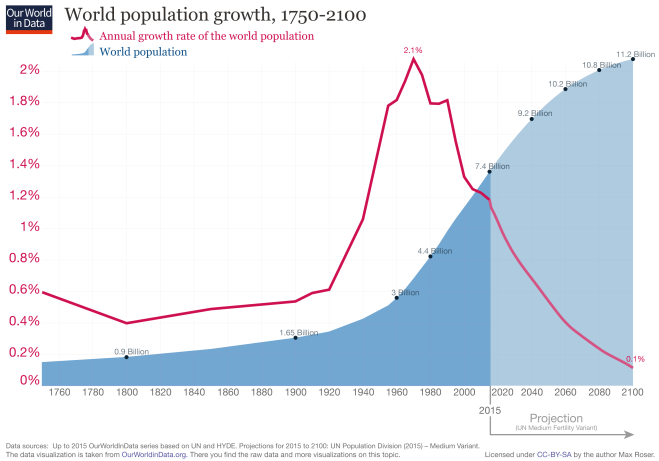The more things change, the more they stay the same. But this time it is really different:

What an uncomfortable graph. Sometimes when things scale, they are just a bigger version of the small thing. However, at times, they also develop new properties. A population of cells becomes an organ – and has new properties. A large teddy bear can be used as a pillow, while a small one cannot.
What can a large human population do that a small one couldn’t? What does it mean for the individual?
The above graph of world population vs time scares me because we’re going into the unknown. In a sense, each one of us is less important. It takes much more to compete. If you are “one in a thousand”, in 1800 that would have got you places. Today, not so much.
What does that mean for individuals? Can such a demand for food, water and energy be met, never mind sustainably? How do we find a place in such a competitive imminently expanding world? Albeit we’re no longer accelerating the growth, the sheer numbers are a little bit unnerving.

Not to fall into conspiracy theories or 1984/Brave New World despair, but for the sake of an analogy, consider cows, or minks, or any other farmed animal. I’ve always felt that breeding animals to kill them is a kind of (?necessary) evil, but it is somehow made better by the fact that they are bred. They don’t have to worry about food and get to have lots of babies. In a roundabout way, they have won in the Darwinian casino.
But then I wondered: if cows and minks are bred for their meat and their fur, are we kind of… bred for economic growth?
Each one of us has to comply with the assertion that success comes from having lots and lots of things in order for this to be perpetuated. Few people look for fame and fortune to exercise some kind of power (if you prefer “change the world”) – and to be fair I have respect for such people.

I get the sense though that to most people, fame and fortune is an end in itself. Furthermore, I suspect it is a product of our culture rather than just hedonism. For a proper first principles hedonist, it would never make sense to work so hard to have things they will never get time to enjoy.
I’ve always found it fascinating that the very people I know from school that were so rebellious that they just wouldn’t comply with the simplest of instruction become exemplars of compliance and obedience when there is a paycheck involved.
It’s someone’s birthday?
“I’ve work tomorrow.”
Can’t stand the sight of the boss?
“I have to go to work.”
Wife giving birth?
“I better get to work, so.”
It seems that no amount of personal problems can stand in the way of being at work. And when it does happen, the rest of the working tribe treats it as some kind of weakness and/or deceit to get out of doing work.
Buckminster Fuller comes to mind:
“We should do away with the absolutely specious notion that everybody has to earn a living. It is a fact today that one in ten thousand of us can make a technological breakthrough capable of supporting all the rest. The youth of today are absolutely right in recognizing this nonsense of earning a living. We keep inventing jobs because of this false idea that everybody has to be employed at some kind of drudgery because, according to Malthusian Darwinian theory he must justify his right to exist. So we have inspectors of inspectors and people making instruments for inspectors to inspect inspectors. The true business of people should be to go back to school and think about whatever it was they were thinking about before somebody came along and told them they had to earn a living.”
“Inspectors of inspectors”… The irony. A friend of mine, a former employee of a multinational once pointed out: we have trackers for trackers. Entire days are spent changing amber to green and red to amber.
Some also theorise that very few jobs require 9-5 x 5 days a week. A lot of time is spent being idle. Why then do the employers insist of you being there? I would argue it isn’t the employer: it’s the culture. Some people won’t take their job seriously if they are given the autonomy to manage their own time (though I always bet on the opposite when looking for people in my own ventures).
If you think about it, it’s kind of disrespectful to insist that someone is there just so that their boss has the option of coopting them into some work engagement. Another interesting (?side) effect is that predictably a person has no strength to create anything outside of work. An eight hour day of being surveyed and judged, a draining commute, an uncomfortable suit and a toilet seat you cannot sit on… As Taleb puts it:
“In short, every organization wants a certain number of people associated with it to be deprived of a certain share of their freedom. How do you own these people? First, by conditioning and psychological manipulation; second by tweaking them to have some skin in the game, forcing them to have something significant to lose if they were to disobey authority –something hard to do with gyrovague beggars who flouted they scorn of material possessions.”
I wonder if it is becoming harder, though, to be a gyrating roaming monk (these days they have a Mac and are called digital nomads) given that the population is growing. Is there room to be an individual? Nietzsche has his concerns:
“Those who commend work. – In the glorification of ‘work’, in the unwearied talk of the ‘blessing of work’, I see the same covert idea as in the praise of useful impersonal actions: that of fear of everything individual. Fundamentally, one now feels at the sight of work – one always means by work that hard industriousness from early till late – that such work is the best policeman, that it keeps everyone in bounds and can mightily hinder the development of reason, covetousness, desire for independence. For it uses up an extraordinary amount of nervous energy, which is thus denied to reflection, brooding, dreaming, worrying, loving, hating; it sets a small goal always in sight and guarantees easy and regular satisfactions. Thus a society in which there is continual hard work will have more security: and security is now worshipped as the supreme divinity. – And now! Horror! Precisely the ‘worker’ has become dangerous! The place is swarming with ‘dangerous individuals’! And behind them the danger of dangers – the individual!”
It’s pretty clear that Nietzsche’s talking about institutional employment.
This essay of mine isn’t about robbing the rich or some other way of getting out of work. It’s not promoting Zuckerberg’s universal basic income. It’s about the fact that work is indeed glorified. Much of what is called work is being trapped in purposelessness.

And it’s not even work that is glorified: nobody cares about the labour of a painter who hasn’t (yet) made their hobby into a job or a blogger, or whoever. It is the stamp of approval from some institution that people really respect. Perhaps, it is just easier to relate to.
I suppose, being Russian, I can’t help but be reminded of how easily institutions fail. Countless Russian firms have risen to unbelievable heights and quickly died in the last 20 years. Even the USSR itself: seeing such a behemoth collapse shatters one’s faith in institutions.
And it wasn’t even that weak, with real industry and gargantuan natural resources. In a completely different context, where I am now – Ireland – also has become a State and gone through a couple of different names in the XX century. That empire disappeared too.
Nietzsche above and Taleb (in multiple works) have spoken about this security that people look for. The security that people trade a portion of their freedom for. Clearly though, it is an illusion. Remember 2008?

Meanwhile, the seaside restaurant beside me boasts having been established in 1728. Chin chin, Mr Taleb, and chin chin to everyone being creative and working hard to not lose your individuality among the impending billions.


Our pay as you go (or die) culture has certain ramifications. I remember when
LikeLike
Our “pay as you go (or die) culture” has definite consequences. I remember back when a number of students came to the college I was working at from the “Eastern Block” back in the 1990’s. Some of these students got jobs on campus. It became apparent that if you gave them instructions and a task, they would do it it quite cheerfully ans efficiently but when they were done, they would stop and wait for another order. We suggested that if they didn’t have anything to do there was always a way to make themselves useful, even to picking up a broom and sweeping, but the behavior persisted. In time we learned that in their home countries, work was hard to come by and if any of them became “busy beavers” by doing things on their own initiative, there might not be enough work available to hire the next guy. They were told explicitly by their co-workers that this was to be the case if they wanted to continue working where they were.In other words, the demand that everyone have a job to work destroyed initiative, etc. all of the things the oligarchs prize so much. So, while those same oligarchs are doing their darndest to turn us into obedient robots, We will be seeing more of these “unintended consequences of their demands.
Also, a universal income will not work. it will just distort prices and the poor will continue to be poor. I think we have to look at universal housing and food allotments, and health care. If there aren’t tangibles involved, the poor will still be shopping at the company store.
LikeLiked by 2 people
Great points. Indeed, I’ve heard the stories just like you described from the Eastern bloc inhabitants.
LikeLike
Great comment!
I feel that your theory for the ‘Eastern Block’ kids has spread to all younger folks. I’m training a 20 yo and I can’t get her to think about the next task… whereas I’m thinking which 10 tasks I can do at the same time.
I don’t know who has the better way of thinking… She’s not stressed like I am!
LikeLike
I think we have formalised education to the point that people follow “5 steps to x” and then wait for someone to hold their hand again!
LikeLiked by 1 person
This was a great read!
I have believed for years the 40 hour workweek is to keep us all passive to the gov and other issues around us.
The stress of it is driving many of us to the grave or padded rooms. Depression, anxiety, high blood pressure… they are all becoming problems in so many folks lives. I even feel its effecting the children folks are trying to raise, as they have no time for them.
I really liked Nietzsche’s thoughts on it.
I also feel that advertising, T.V., and society puts such a strong meaning on money, not happiness. If you don’t own +++ then you’re meaningless.
I am trying to escape this madness. I work an average of 50 hours a week. (I’m a landscaper) For what? Money. I have very little job satisfaction, as my clients are 1%ers that appreciate very little and everything is an emergency. How are annual flowers an emergency? Well, when the neighbors are planted before you… You must not have a good service. Or to even be mowed on any other day but Friday. You must be a loser. Yes. They are that superficial.
I’m trying to get out of this craziness and live a simple life… wish me luck! 😘
LikeLiked by 3 people
Oh dear! That’s actually insane – I can’t believe people are that contrived. It’s crazy what you can train people to value! Best of luck and thanks for sharing your insights
LikeLiked by 1 person
Hi Martina. I started reading your blog (I always like them!) but I think you mean bred, not bread, and it was distracting, so I’m sending you this. Perhaps I am wrong in terms of British spelling or something, but give it a check, and then delete this comment…:)
LikeLike
Indeed, thanks for that
LikeLike
The glory in all this is that, every so often, we get to read a truly cogent and thought provoking post. Don’t you find it amazing that there resides such an abundance of interesting topics in the world? And that they can be combined and intertwined in such a way that the fabric they weave, spread out like a picnic blanket, can support so much additional thought and philosophical exploration. –Thanks for this Martina.
The hockey stick of human growth and impact on the world can’t help but stun the most plebeian of life’s students. I’ve examined this phenomena at length over the years and have derived many associated theories and conclusions. This expose’ of yours regarding humans impression of themselves in light of the explosive growth of we as a world organism is new to me.
Lately, I’ve been trying to understand why, from the planting of our agrarian roots and the rise of civilization, we’ve self organized into the pervasive yet insidious hierarchy of owners and workers. I’m now looking at this relationship (which in my mind is the source of inequality) in light of the shear numbers of us. Have we built this cage of ours by nothing more than being populous? If it’s not a product of our massive number and therefore a permanent part of our nature then can we undo it somehow? Regardless, can we adjust our worker’s beliefs such that, to work is to contribute. To contribute is to participate in the creation of wealth? And when we participate thusly, we all become equals who can bask in the fruits of all of our labor? (One can hope.)
Thanks again,
AM
LikeLiked by 1 person
I don’t know if there is actually a way out. I was watching a documentary today – I’ve watched one every day this week. Observing how nature works hammers home concepts that are against all of our sweet talking politics. Maybe like Steve said, food and shelter need to be directly provided. I’ve heard Ayn Rand mentioned a lot – so I’ve started reading her now. She had a few (righty) theories about it. I will without a doubt critique them here for what it’s worth!
LikeLiked by 1 person
A drop of Harari to end your Monday evening:
https://www.bloomberg.com/view/articles/2017-06-04/universal-basic-income-is-neither-universal-nor-basic
LikeLike
Haha! Something we can all agree on!
LikeLike
I tried to read Ayn Rand just for the purpose of critiquing her, but the books are so long and not (IMO) very well written; it didn’t seem like the opportunity cost of all the other books I could be reading would be worth it. But if you make it through them, I’d love to hear what you think.
LikeLike
The Protestant Work Ethic seems to have a lot to do with this, at least here in the US where I sit. I’m an aspiring writer–I have been since age 7–but I was always pushed by all figures of authority to find something that someone will pay me to do, even if I spend most of my time sitting around contributing little. If I were left to my own devices, perhaps with a UBI or something to make sure I don’t starve, I would be ever so much more productive, and create things that have more value to more people. But if I did this, even if I were working harder, I’d be seen as lazy. (I guess being a writer is, by default, lazy to many people.)
So then I wonder, is it morally wrong for me to use my idle time at work to do my own writing? Many would say so. But if there’s nothing for me to do, why do I have to be there? But if it’s revealed that my job turns out to need less work, then I’ll get paid less to do it, so many people will not want this fact to come to light. (Whereas many people who work more than 40 hours a week don’t get paid overtime…. It’s all quite messed up.)
I am so encouraged to see more and more posts and other public dialogue on this topic. Keynes famously said that by 2030 we’d be working 15 hours a week. Unfortunately, technological development has promoted consumption at the expense of leisure. And that’s having health impacts, like Midwestern Plant Girl noted. So many people are so stressed! Even the Harvard Business Review noted recently that calling ourselves “crazy busy” is the new high-status remark, unlike when Veblen talked about the Leisure Class (i.e., the upper classes).
Here’s a great article that a friend shared with me recently on this subject: http://nautil.us/issue/46/balance/darwin-was-a-slacker-and-you-should-be-too Again, SO glad that this is getting discussed! We gotta get out of this arbitrary 40-hour prison we’ve created for ourselves. As you noted, it doesn’t even provide the security we think it should….
LikeLike
I agree with everything you said here: I’ve felt a lot of the same pressures throughout my life. The article on Darwin is great too!
LikeLike
The first time I heard the term UBI it was being banded about as a cost-effective replacement for the benefits system, which costs money to run; it would be cheaper (they said) to just dish out the same basic rate to everyone and claim back in the form of taxes from those that can afford it. But I clearly need to read more about it. I recently watched a TEDx talk arguing the need for work not jobs, and it too mentioned UBI: https://youtu.be/sQNtu4kpd64 We all need purpose and I can see that a UBI doesn’t provide this on its own.
LikeLike
The trouble with linking “purpose” to jobs is that it doesn’t work that way for everyone. (Not even most people, judging from my circle of friends.) There is a lot of make-work out there (even in high-status high-pay jobs) that doesn’t provide any real purpose (except filling some bureaucrat’s or CEO’s orders, which could be satisfying to someone, but often isn’t). I really agree that people need purpose in their lives; the problem is that all the things I do that make me feel like I’m contributing to society meaningfully — i.e., my purpose — are things I do after doing the 40 hour job that I need to do in order to have health insurance, pay rent, and buy food. (Actually, I could probably drum up enough funds ‘doing what I love’ to cover food and other necessities, but not rent and not health care.)
But you’re right that UBI is banded about as a replacement for the benefits system. I think it shows where we are as a society that both right wing think tanks like the Cato Institute and leftist groups like the Democratic Socialists of America are both interested in UBI. But DSA will quickly point out that UBI needs to be part of a robust welfare system, not the replacement for it that Cato suggests.
LikeLiked by 1 person
Thanks for your reply Jessie; it’s a tough world, needing to work a 40-hour week in order to survive.
LikeLiked by 1 person
Thanks for your comments Brian! I think we are all indeed competing, but a 40-hour work week isn’t always the most efficient way of doing it despite our cultural norms!
LikeLike
That’s something that I sort of resent about my upbringing: that purpose and job were made out to be same thing! Agreed!
LikeLiked by 1 person
You raise some interesting questions, Dr. Martina. I’d like to comment on your following question: “But then I wondered: if cows and minks are bred for their meat and their fur, are we kind of… bred for economic growth?”
As I see it, the large masses of poor individuals ensure a cheap labor force for the small elite class that controls production and fill the ranks of their military forces to protect their resources. Economic growth is just their facade of keep their coffers full and maintain domination.
LikeLiked by 1 person
I still hope it’s not quite so desperate… Thanks for stopping by Rosaliene!
LikeLike